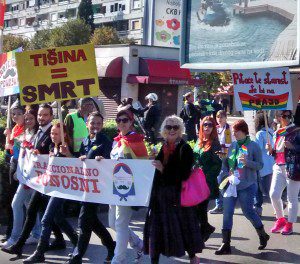Emile Affolter, Amnesty Netherlands press officer, celebrates the courage of those taking part in Montenegro’s 2014 LGBTI Pride, after last year’s event was marred by shocking violence.
About 160 people walking the streets of the capital of Montenegro on a sunny Sunday morning. It might not sound spectacular, but it would be hard to overestimate the importance of this particular march. These 160 people were part of the second ever LGBTI Pride in Podgorica, organized by a board of activists and the NGO, Queer Montenegro. They took to the streets demanding equal rights for sexual minorities and respect for basic human rights.
Last year the Montenegro Pride in Podgorica was the stage for violent counter-demonstrations, leaving over sixty people injured, including police and participants. Although the police came out in full force to protect participants of the march, the people responsible for these violent attacks were never properly prosecuted.

Traditionally proudThis Sunday, in sharp contrast to last year, there was no violence. People marched peacefully, carrying banners with inclusive slogans such as ‘Let’s love each other’, ‘This is just the beginning’, and ‘Traditionally proud’. They were protected by 1,800 police officers who did a very professional job, something the organizers applauded in their speeches.
Before the event, the atmosphere had been tense. On the eve of the Pride, a community centre run by LGBT Forum Progress, a local NGO, was advised to close its doors for the day because of mounting tensions. Since opening in January, this centre has been vandalized more than twenty times. The attacks range from smashed windows to the use of teargas against visitors.
Stevan Milivojevic, executive director of LGBT Forum Progress, has been harassed and attacked many times. According to Stevan, there are major problems with the way the police and public prosecutor handle attacks against the LGBTI community. They classify attacks as ‘misdemeanours’ rather than criminal offences, and don’t make use of an existing law on hate crimes.
Remarkable courageOrganizers say that cooperation with police has greatly improved over the last year. But there is still a lot of work to be done. About 70% of people in Montenegro consider homosexuality to be a form of disease. Earlier in the week, Bishop Amfilohije of the Serbian Orthodox Church called the upcoming Pride march ‘a parade of death and self-destruction’. With this in mind, the courage of those marching the streets of Podgorica is even more remarkable.
Hopefully this Pride is another step towards a Montenegro that not only ensures protection for the LGBTI community during the event, but protects, accepts and embraces it all year round. These 160 committed people walking the streets of Podgorica last week sent a very clear message: This is just the beginning.

